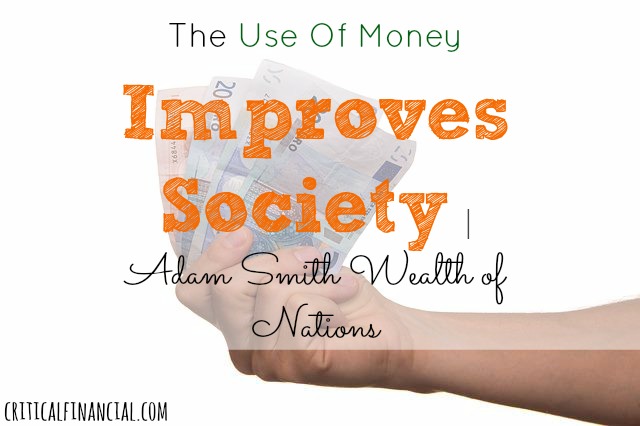
Money is a unit of exchange that we take for granted. We grew up seeing coins and bills, fingered a few when we earned allowance at home, counted out more paper when we cashed the initial check from our first job, and still like its feel when we sell something to someone and demand cash. We never think of a time when money was not part of our lives, or a part of our society.
Yet, the role of money throughout history in society has changed much over the millennia when coins were first stamped. It could be said, in fact, that the more widespread money is used in a culture, the more just that society is.
Among many other revolutionary ideas that he had, Adam Smith wrote a lot about how money improves the functioning of a society in his famous work Wealth of Nations (1776). Beyond is famous quote that “All money is a matter of belief,” he cited these advantages of money in society:
Adam Smith noted that the durability and divisibility of precious metals made money feasible, which has made it possible for people to exchange goods and services without having to break out a scale to measure how much wheat can be exchanged for a bag of apples, for instance.
Vital to the Healthy Growth of a Country
- It greases the wheels of the crucial interplay between town and country (city and rural area). This continual exchange of raw material for manufactured goods is vital to the healthy growth of a country. Farmers need to know that they will receive a just payment for their crops, while townspeople need to know that they can have easy access to foodstuffs that ensure life. No matter how self-sufficient a farmer might be, he cannot produce everything that he needs to run a farm, even a primitive one. No farmer has the time or skill to make wagon wheels, for instance, or in modern times, his own automobile. Likewise, a worker on the assembly line will not have adequate space in the city to grow enough food for his/her family’s needs. Money keeps the circular flow of farm-to-city-to-farm going, thus powering an economy and enabling everyone to make a living. Such division of labor is absolutely key to a society achieving economic balance and growth.
Enables a Society to Trade with Another
[adsenseRight]
- To take the flow of exchange to another level, Adam Smith showed how money enables a society to trade with other societies using an agreed-upon scale. It opens up the entire world to commerce if a certain unit of money can be agreed upon concerning its value. Although Smith, illustrated in Wealth of Nations, generally favored local industry, he also knew that money could make it possible for someone in Great Britain to exchange a good with someone far outside his homeland, through the use of money. Money paved the way for globalization, for better or worse. If manipulated wisely, global trade can be a source of great wealth to any nation that provides a desirable commodity. Money makes that possible.
Increases Transactions; Size and Efficiency
- Adam Smith eloquently pointed out that money inevitably increases the number, size and efficiency of economic transactions, which usually serves as the fuel for a robust economic engine, provided that an elite (especially a governing elite) is not hoarding the profits of exchanges of goods and services. According to Wealth of Nations, as people were able to convert their labor into money quickly, they worked longer and harder because their reward was sure and the goods that they produced did not have a limited, short lifespan. Money makes this possible in a society. It is vital to the “invisible hand” that motivates and moves workers.
Non Farmers could Participate Easily in Marketplace
- A by-product of money’s widespread use in society was the rise of the modern urban world. The use of money (and not grain) as a means of exchange meant that non-farmers could participate quickly and easily in an economy, with its attendant rewards. As a result, densely packed urban areas multiplied and provided the muscle and manpower for wealthy nations to arise. There is no question that farmers are a backbone of American society, for instance, but farmers are no longer the backbone of our country. If you are going to lobby for certain occupations being backbones of a society, you had better include trades such as entrepreneurs and investors, people whose livelihoods would not be possible without the use of money in commerce.
Finally if you’re interested in reading what Adam Smith had to say himself, consider picking up a copy of The Wealth of Nations on Amazon. Its been in print since 1776, so you know its pretty much one of the world’s greatest books.

